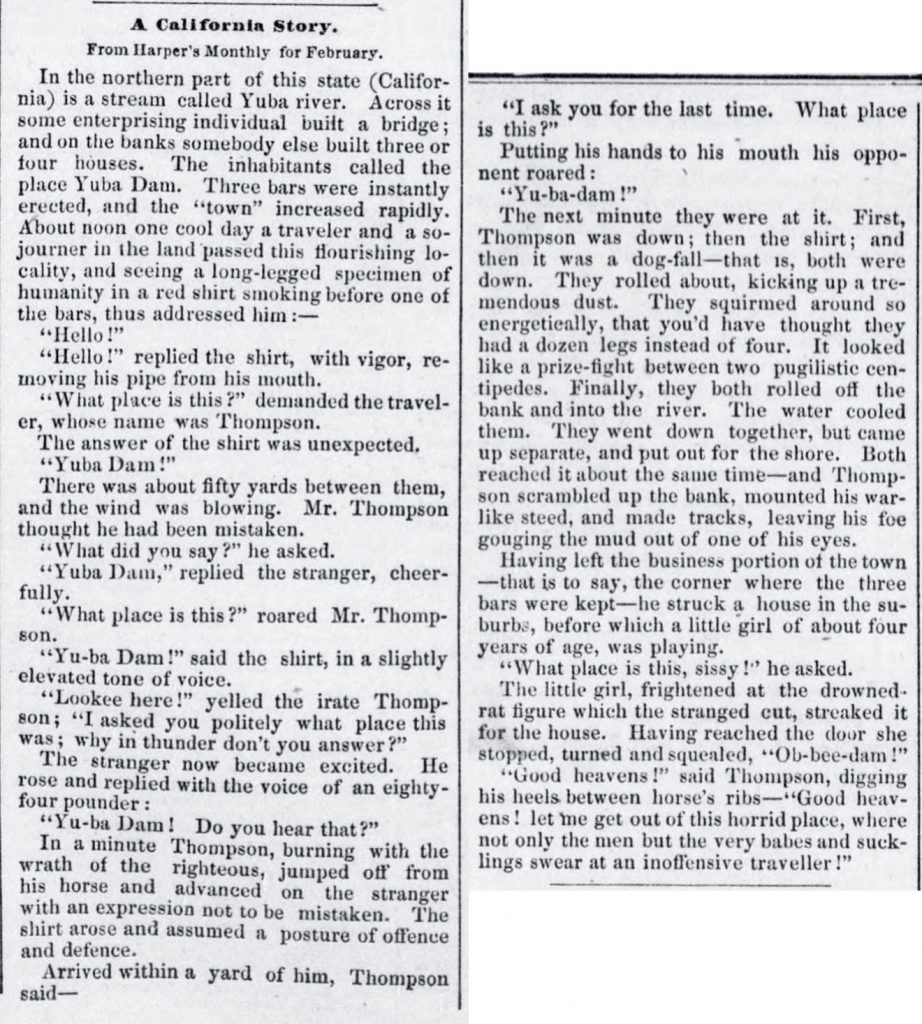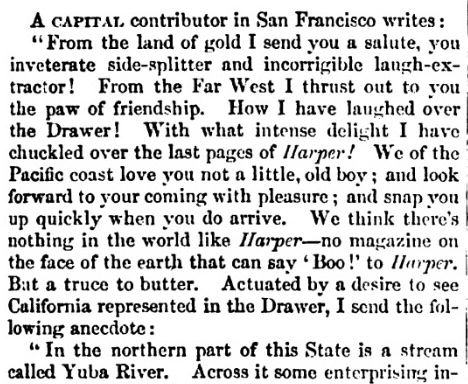In Chapter 45 of The Innocents Abroad, Mark Twain writes about traveling from Damascus to Kafr Hawr (which he calls Jonesborough), and then continuing on the following day to Banias. Twain wrote:
“We left Jonesborough very early in the morning, and rode forever and forever and forever, it seemed to me, over parched deserts and rocky hills, hungry, and with no water to drink. At noon we halted before the wretched town of El Yuba Dam, perched on a side of a mountain, but the dragoman said if we applied there for water we would be attacked by the whole tribe, for they did not love Christians. We had to journey on.”
The Innocents Abroad, Chapter 45.
It’s possible to identify the town of Jonesborough as Kafr Hawr, because Twain himself records the name of the town in his journal as Kaf’r Houer, and fellow excursionist William Denny identifies the town in his journal as Kefr Hauwar. In addition, in case there was any question, Twain describes the town as being the location of Nimrod’s tomb, and two guidebooks that Twain referenced (Tent Life in the Holy Land and A Handbook for Travellers in Syria and Palestine) both note the belief that Nimrod’s tomb was located in Kafr Hawr.
That leaves the question of what town is El Yuba Dam? Some people have tried to figure out which town in Syria this is referring to, like Jonesborough. Ian Strathcarron, who wrote an account of his attempt to retrace Twain’s trip called Innocence and War, believed that Jonesborough was Quinetra, and describes the unreachable destroyed town in the no-mans land between Syria and Israel. However, as we know from the above references, there is no question where Jonesborough was actually located.
Strathcarron continues his journey, deciding El Yuba Dam must be Odem, an Israeli town in the Golan Heights. It seems he determines this by looking at a 1922 British Mandate map, which says the ‘Yuba’ means crater, and that ‘Dam’ means spring, and Odem is located on a volcanic crater and has water. That Twain would have had to double back from there to get to Banias doesn’t seem to bother Strathcarron. What’s funny about his search, however, is that El Yuba Dam never existed, or even if it did, the name Twain gave the town had nothing to do with the actual town. It’s as if one tried to located Jonesborough in the book by determining the meaning of Jonesborough.
El Yuba Dam is a joke.
Like the insertion of a well-known advertisement that his readers would all be aware of, Twain also makes a reference here that a large portion of his readers would know. In early 1863, while Twain was working as a reporter for the Territorial Enterprise newspaper in Nevada, a short story was published in newspapers across the United States. The story’s author isn’t published with the story. In most cases it’s just printed as is without any introduction, and usually titled A California Story.
Here is one example, which showed up on the front page of the Worcester Daily Spy:

If you don’t think the story was well known, here are links to fifteen different copies of the story. There are many more. These were found on the Library of Congress Chronicling America database and the Fulton History database. Click on the date to go to the page online.
| Newspaper | Location | Date |
|---|---|---|
| The Camden Confederate | Camden, CA | 1863-06-12 |
| The Grand Haven News | Grand Haven, MI | 1863-02-11 |
| The Big Blue Union | Marysville, KS | 1863-03-21 |
| The Daily Green Mountain Freeman | Montpelier, VT | 1863-01-31 |
| Worcester Daily Spy | Worcester, MA | 1863-01-27 |
| The Alleghanian | Ebensburg, PA | 1863-02-12 |
| Chicago Daily Tribune | Chicago, IL | 1863-02-24 |
| Lamoille Newsdealer | Hyde Park, VT | 1863-02-05 |
| The Weekly Pioneer and Democrat | Saint Paul, MN | 1863-02-06 |
| The Weekly North Iowa Times | McGregor, IA | 1863-02-11 |
| Smyrna Times | Smyrna, DE | 1863-02-12 |
| Orleans Independent Standard | Irasburgh, VT | 1863-02-13 |
| Monmouth Herald & Inquirer | Freehold, NJ | 1863-02-26 |
| Long Island Farmer | Jamaica, NY | 1863-03-24 |
| The Rondout Freeman | Rondout, NY | 1863-02-04 |
You may have noticed that the version posted above from Worcester lists the source — Harper’s Monthly. It is tempting to track that down to find the original author, but that too turns out to be a dead end, as the Harper’s Monthly version was seemingly submitted by a reader in San Francisco, and not by the actual author, and is still unsourced. Here is the introduction to the article in Harper’s Monthly:

So what does this story have to do with the town in Syria? The story is a humorous story about a man who finds himself in an unknown town, and asks different residents what the name of the town is, and they all answer Yuba Dam. The man thinks they’re all swearing at him, saying You Be Damned. There may or may not have been a town that Twain had to skip because they hated Christians. If there was, Twain likely named the town in the book from this story, as a way of saying that the inhabitants were telling them, as Christians, “you be damned”. And even if there wasn’t a town where this happened, it seems likely Twain’s version in the book is a reference to this newspaper story.
How do we know that Twain knew about this story, other than it had recently been published all over the country, and well known? Remember how the story does not list an author? Stephen Winick, a folklorist at the Library of Congress, found that piece of the puzzle while researching the history of this story, and the poems and songs it spawned. Winick found a poem based on the story, published in 1865, whose introduction points out that it is based on the previously published story, which they say was written by a former correspondent of the newspaper named Dan De Quille. Who was De Quille? He was a journalist who in 1863, at the time the story was originally published, was working at the same newspaper as Twain, and was Twain’s roommate.
Do we know for sure that Twain’s naming of the town El Yuba Dam was a hat-tip to his former colleague in Nevada? No, of course not, but it seems highly likely that was the case.
Leave a Reply